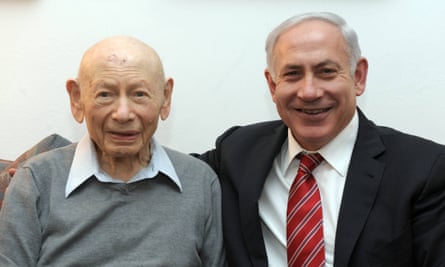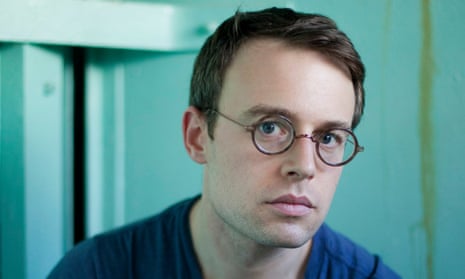The first obligation, when turning to the work of the electrifying American writer Joshua Cohen, is to stress that he clearly is a genius. In his essays (Attention!) and stories (Four New Messages), and in novels such as Witz, Book of Numbers, Moving Kings and now The Netanyahus – a comic historical fantasia – a dizzying range of bookish learning and worldly knowhow is given rich, resourceful expression. Cohen, who turned 40 last September, has prompted all the desirable M-words (master, magus, major) as well as comparisons to Thomas Pynchon (justified) and David Foster Wallace (slightly lazy). While James Wood settles for calling him one of the most prodigious stylists at work in the US today, Nicole Krauss has flatly declared that nobody writing in English is more gifted.
Cohen’s new novel, a sidelong portrait of the Israeli prime minister’s father, has its origins in admiration spurred by his earlier work. In May 2018, he received an email from Harold Bloom, the celebrated critic and longtime Yale professor, summoning him to Connecticut. The resulting encounter was transcribed in the Los Angeles Review of Books. Bloom later included Book of Numbers in his posthumously published account of 48 novels “to read and re-read”. The Netanyahus is dedicated to Bloom’s memory, and fills out a story that the critic told Cohen about playing chaperone to Benzion Netanyahu, a Polish-born, Israel-based academic better known as Benjamin’s father, during a visit to Cornell. Fills out, and wildly fictionalises: Harold Bloom, defender of the western canon, becomes Ruben Blum, a specialist in American economic history at Corbin college in New York state. He is chosen, as the only Jewish faculty member, to host an obscure historian of late-medieval Spain – Netanyahu’s real speciality – who is coming for an interview.
It’s a source of slight disappointment that Cohen didn’t stick closer to the record. It would have been fascinating to see a writer of his erudition explain why a Jew from the Bronx, raised speaking Yiddish, devoted his considerable talent and even greater energy to the promotion of poetry and plays by English Protestants. In the final pages, an author figure with many resemblances to Cohen gives what seems a sincere account of his conversations with Bloom, explaining that he changed the details of the Netanyahu incident to protect the living, though it becomes clear that this passage, though presented as an afterword, is itself at least partly fabricated. (I know that Bloom never met WG Sebald and somewhat doubt that Cormac McCarthy used to phone him from the bathtub.)

The bulk of the novel is given to Blum’s wonderfully pedantic account of his Corbindale existence and the visit paid in January 1960 by the Netanyahu family – Benzion, his wife, and their three wild, ribald sons (Benjamin plays a minor though not unmemorable role in proceedings). This cold, inauspicious evening provides ample opportunity for Cohen’s descriptive powers. Snow comes “hissing down like static from a world turned-off”. Benzion is portrayed as “an uncompassed loner in the snowy wastes”, the soles of his shoes flapping loose “like a horse’s lips”. With its tight time frame, loopy narrator, portrait of Jewish-American life against a semi-rural backdrop, and moments of cruel academic satire, The Netanyahus reads like an attempt, as delightful as it sounds, to cross-breed Roth’s The Ghost Writer and Nabokov’s Pale Fire.
Yet the novel may also help to explain why Cohen doesn’t possess a fame equal to his talent. The ebullience and hyper-fertility that accounts for his work’s rare pleasures can produce an engulfing excess. This is a brisk, impudent, utterly immersive novel that also wants to answer questions about Jews and history (the past serving as a distraction from the pain of present realities), Jews and identity politics (and the amnesia of the current incarnation), Zionism and the US (and the conflicting forms of Jewish mutation after the Holocaust), the distinction between Rhenish and Russian immigrants, and the paradoxes of the diaspora. Of its dozen chapters, two are given to letters that Blum receives from academics about Benzion’s career (one lasting 18 pages), and another two take the form of lectures that Benzion delivers on campus, one a kind of Bible class, the other a disquisition on his chosen field of study. Even with Blum as an affable mediating force, I didn’t understand every current that the visit stirred up.
There’s a moment towards the end that seems to signal an alternative road – a focus that might serve better to conduct Cohen’s awe-inspiring gifts, and yield a calmer kind of wisdom. It comes when Blum is walking with his wife towards the end of what he calls “that Netanyahu-day”. “I’m sick and tired of hearing about Jews,” she tells him. “I’m talking about the two of us.”
The Netanyahus by Joshua Cohen is published by Fitzcarraldo Editions (£12.99). To order a copy go to guardianbookshop.com. Delivery charges may apply.
